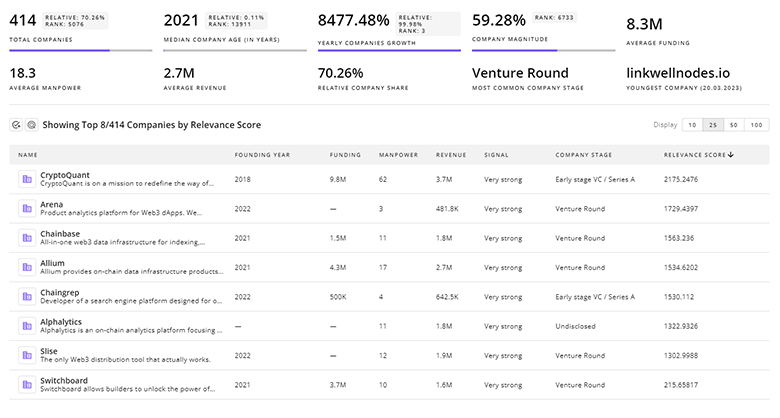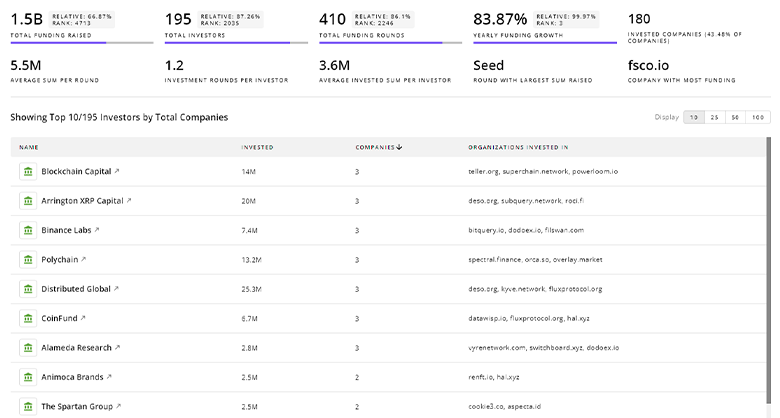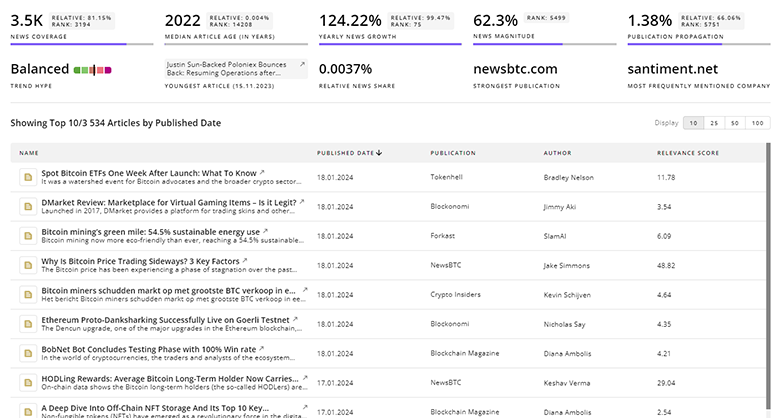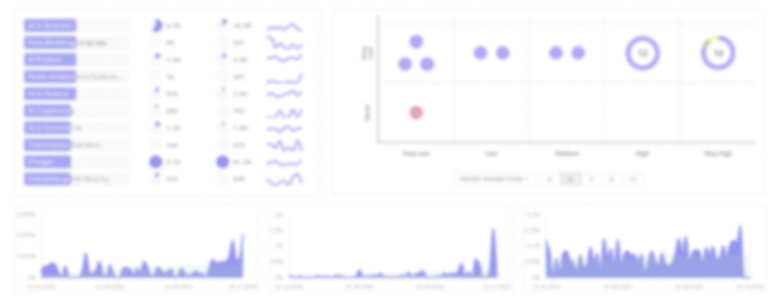
Prebiotics Report
: Analysis on the Market, Trends, and TechnologiesThe global prebiotics sector has secured $15.71 billion in total funding, with average annual funding growth of 5,173.76 percent over the past five years (internal prebiotics trend report), and is projected to expand from USD 6.95 billion in 2023 to USD 13.26 billion by 2029 at an 11.37 percent CAGR, driven by rising demand in food, supplements, and animal feed applications (Allied Market Research – 2025).
The last time we updated this report was 80 days ago. If there’s something missing or off, your tips are welcome!
Topic Dominance Index of Prebiotics
The Dominance Index for Prebiotics merges timelines of published articles, newly founded companies, and global search data to provide a comprehensive perspective into the topic.
Key Activities and Applications
- Novel Formulation Development: Companies are engineering multi-fiber and oligosaccharide blends tailored to specific health needs, such as individualized microbiome profiles and targeted bacterial strain support.
- Targeted Delivery Systems: Microencapsulation and controlled-release techniques are employed to protect prebiotics through digestion and ensure they reach the colon intact.
- Diversification of Raw Sources: Research is exploiting unconventional feedstocks-lignocellulosic residues, marine algae, and agricultural by-products-to produce cost-effective, sustainable prebiotic ingredients.
- Health-Condition-Specific Applications: Prebiotics are formulated for diabetes management, gut-brain axis modulation, immune support, and mental health interventions, reflecting a move into therapeutic nutrition.
- Synbiotic Combinations: Integration of selected prebiotics with probiotic strains creates synbiotic products that enhance probiotic survival and colonization, amplifying gut-health benefits.
Emergent Trends and Core Insights
- Personalized Nutrition: The shift toward microbiome-based customization is evident, with patent filings focusing on compositions matched to individual gut profiles.
- Strain-Specific Targeting: Prebiotics engineered to feed butyrate-producing bacteria or specific Bifidobacterium species aim to maximize therapeutic outcomes.
- Synergistic Blends for Efficacy: Multi-component mixtures demonstrate additive or synergistic effects on gut flora, outperforming single-ingredient formulations.
- Sustainability and Circularity: Upcycling of food and agricultural waste streams into prebiotic fibers addresses environmental imperatives while reducing raw-material costs.
- Food and Beverage Integration: Beyond capsules, prebiotics are increasingly incorporated into yogurts, snack bars, beverages, and even confections to meet consumer demand for functional everyday foods (News Landscape Report).
Technologies and Methodologies
- Oligosaccharide Synthesis & Modification: Enzymatic processes and polymerization techniques yield tailored oligosaccharides with defined chain lengths, sweetness, and fermentation profiles.
- Advanced Extraction & Purification: Techniques like column chromatography and freeze-drying isolate high-purity prebiotic fibers from diverse feedstocks while preserving bioactivity.
- Microencapsulation & Controlled Release: Encapsulation technologies protect prebiotics from gastric degradation, enabling targeted colonic delivery and extended shelf life.
- Fermentation & Bioprocessing: Optimized microbial fermentation workflows produce high-yield fibers and synbiotic combinations under controlled conditions.
- Analytical Screening Assays: In vitro and in vivo assays evaluate prebiotic efficacy against gastrointestinal and systemic disease models, guiding formulation refinement.
Prebiotics Funding
A total of 354 Prebiotics companies have received funding.
Overall, Prebiotics companies have raised $15.6B.
Companies within the Prebiotics domain have secured capital from 1.4K funding rounds.
The chart shows the funding trendline of Prebiotics companies over the last 5 years
Prebiotics Companies
- PREEBIO leverages Technion-originated patents to develop protein-based prebiotics with anti-inflammatory properties and targeted gut delivery; recognized as a Probiota Pioneer 2024 for its disruptive approach to combining proteins and prebiotic fibers.
- COMET uses patented upcycling methods to convert agricultural side-streams into Arrabina dietary fibers, achieving NutraStrong (TM) Prebiotic Verified Certification and advancing sustainability in ingredient sourcing.
- Intrinsic Organics specializes in 100 percent organic inulin from Jerusalem artichoke (OprJA), holding FDA GRAS status and earning finalist status for Ingredient of the Year in Microbiome Modulation at NutraIngredients-USA 2024.
- Solnul (R) offers a resistant starch prebiotic with demonstrated “beyond-the-gut” benefits on skin and cognitive health via the gut-skin and gut-brain axes, marking a pioneering move into holistic wellness applications.
- Layer Origin Nutrition focuses on human milk oligosaccharides (HMOs) to support cognitive and neurological health, showcasing the commercial potential of infant-nutrition-derived prebiotics in adult health markets.
Delve into the corporate landscape of Prebiotics with TrendFeedr’s Companies tool

2.4K Prebiotics Companies
Discover Prebiotics Companies, their Funding, Manpower, Revenues, Stages, and much more
Prebiotics Investors
TrendFeedr’s Investors tool provides insights into 1.3K Prebiotics investors for you to keep ahead of the curve. This resource is critical for analyzing investment activities, funding trends, and market potential within the Prebiotics industry.

1.3K Prebiotics Investors
Discover Prebiotics Investors, Funding Rounds, Invested Amounts, and Funding Growth
Prebiotics News
TrendFeedr’s News feature offers you access to 2.4K articles on Prebiotics. Stay informed about the latest trends, technologies, and market shifts to enhance your strategic planning and decision-making.

2.4K Prebiotics News Articles
Discover Latest Prebiotics Articles, News Magnitude, Publication Propagation, Yearly Growth, and Strongest Publications
Executive Summary
Prebiotics have evolved from general dietary fibers into precision-targeted, clinically validated functional ingredients, driving market expansion in food, beverage, supplement, and therapeutic sectors. Innovation vectors include personalized formulations, strain-specific targeting, sustainable sourcing, and integrated synbiotic systems. Startups deploying advanced processing and tailored delivery methods are challenging incumbents, while established players diversify into holistic health applications. Strategic focus on rigorous clinical validation, scalable sustainable technologies, and seamless consumer integration will define the next phase of growth in the prebiotics industry.
Are you an insider in the trends or tech industry? We’d love for you to contribute to our content.











